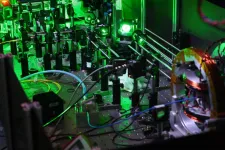Baby's first poop can help predict risk of developing allergies
2021-04-29
(Press-News.org) It may seem like an unusual place to go looking for answers, but the contents of a baby's first diaper can reveal a lot about a newborn's future health.
In a new study published today in Cell Reports Medicine, a team of University of British Columbia (UBC) researchers has shown that the composition of a baby's first poop--a thick, dark green substance known as meconium--is associated with whether or not a child will develop allergies within their first year of life.
"Our analysis revealed that newborns who developed allergic sensitization by one year of age had significantly less 'rich' meconium at birth, compared to those who didn't develop allergic sensitization," says the study's senior co-author Dr. Brett Finlay, a professor at the Michael Smith Laboratories and departments of biochemistry and molecular biology, and microbiology and immunology at UBC.
Meconium, which is typically passed within the first day of life, is made up of a variety of materials ingested and excreted during development, ranging from skin cells, amniotic fluid and various molecules known as metabolites.
"Meconium is like a time capsule, revealing what the infant was exposed to before it was born. It contains all sorts of molecules encountered and accumulated from the mother while in the womb, and it then becomes the initial food source for the earliest gut microbes," says the study's lead author Dr. Charisse Petersen, a research associate in UBC's department of pediatrics.
As part of the study, the researchers analyzed meconium samples from 100 infants enrolled in the CHILD Cohort Study (CHILD), a world-leading birth cohort study in maternal, newborn and child health research.
They discovered that the fewer different types of molecules a baby's meconium contained, the greater the child's risk of developing allergies by one year. They also found that a reduction in certain molecules was associated with changes to key bacterial groups. These bacteria groups play a critical role in the development and maturation of a vast ecosystem of gut microbes, known as the microbiota, which is a powerful player in health and disease.
"This work shows that the development of a healthy immune system and microbiota may actually start well before a child is born--and signals that the tiny molecules an infant is exposed to in the womb play a fundamental role in future health," says Dr. Petersen.
Using a machine-learning algorithm, the researchers combined meconium, microbe and clinical data to predict with a high degree of accuracy (76 per cent), and more reliably than ever before, whether or not an infant would develop allergies by one year of age.
The study findings have important implications for at-risk infants, say the researchers.
"We know that children with allergies are at the highest risk of also developing asthma. Now we have an opportunity to identify at-risk infants who could benefit from early interventions before they even begin to show signs and symptoms of allergies or asthma later in life," says the study's senior co-author Dr. Stuart Turvey, a professor in UBC's department of pediatrics, investigator at BC Children's Hospital and co-director of the CHILD Cohort Study.
INFORMATION:
ELSE PRESS RELEASES FROM THIS DATE:
2021-04-29
Although robotic devices are used in everything from assembly lines to medicine, engineers have a hard time accounting for the friction that occurs when those robots grip objects - particularly in wet environments. Researchers have now discovered a new law of physics that accounts for this type of friction, which should advance a wide range of robotic technologies.
"Our work here opens the door to creating more reliable and functional haptic and robotic devices in applications such as telesurgery and manufacturing," says Lilian Hsiao, an assistant professor of chemical and biomolecular engineering at North Carolina State University and corresponding author of a paper on the work.
At ...
2021-04-29
The best path across the desert is rarely the straightest. For the first human inhabitants of Sahul -- the super-continent that underlies modern Australia and New Guinea -- camping at the next spring, stream, or rock shelter allowed them to thrive for hundreds of generations. Those who successfully traversed the landmarks made their way across the continent, spreading from their landfall in the Northwest across the continent, making their way to all corners of Australia and New Guinea.
By simulating the physiology and decisions of early way-finders, an international team* of archaeologists, geographers, ecologists, and computer scientists has mapped the probable "superhighways" that led ...
2021-04-29
BOSTON - Concerns about fertility often influence how young women with breast cancer approach treatment decisions and are a reason for forgoing or delaying hormone-blocking therapy, a new study by Dana-Farber Cancer Institute investigators shows.
The findings, published online today by the journal Cancer, reinforce the need for physicians to talk with patients about their fertility-related priorities and address them in treatment plans, the study authors write. Such conversations are important not only at the start of treatment but during its entire course, as patients' goals ...
2021-04-29
Scientists from the University of Bristol's Quantum Engineering Technology Labs (QETLabs) have developed an algorithm that provides valuable insights into the physics underlying quantum systems - paving the way for significant advances in quantum computation and sensing, and potentially turning a new page in scientific investigation.
In physics, systems of particles and their evolution are described by mathematical models, requiring the successful interplay of theoretical arguments and experimental verification. Even more complex is the description of systems of particles interacting with each other at the quantum mechanical level, which is often done using a Hamiltonian model. The process of formulating Hamiltonian models from observations is made even harder by the nature ...
2021-04-29
'Superhighways' used by a population of up to 6.5 million Indigenous Australians to navigate the continent tens of thousands of years ago have been revealed by new research using sophisticated modelling of past people and landscapes.
The new insights into how people not only survived, but thrived, in harsh environments provide further evidence of the capacity and resilience of the ancestors of Indigenous people, and help paint a picture of large, well-organised groups navigating tough terrain.
The 'peopling' of Sahul -- the combined mega continent that joined Australia with New Guinea when ...
2021-04-29
There was a hope that as more plants start to grow in Arctic and boreal latitudes as our warming climate makes those regions more hospitable for plants, those photosynthesizing plants would work to help sequester the atmospheric carbon dioxide that helped them flourish in the first place. But new research led by scientists at UC Irvine and Boston University, out in Nature Climate Change, suggests that all the new green biomass is not as large a carbon sink as scientists had hoped.
"What does greening really mean? Can we really trust it to save us from climate change?" said Jon Wang, an Earth system scientist at UCI who the led the work alongside BU Earth & Environment professor Mark Friedl. "A big question is: What'll happen to the carbon that's currently ...
2021-04-29
What The Study Did: This survey study examines the associations of school closure and exposure to COVID-19-related stressors with caregivers' perceptions of their children's mental well-being.
Authors: Tali Raviv, Ph.D., of the Ann and Robert H. Lurie Children's Hospital of Chicago, is the corresponding author.
To access the embargoed study: Visit our For The Media website at this link https://media.jamanetwork.com/
(doi:10.1001/jamanetworkopen.2021.11103)
Editor's Note: The article includes conflict of interest disclosures. Please see the article ...
2021-04-29
What The Study Did: Using insurance claims data, the change in screening rates for breast, colorectal and prostate cancers during the COVID-19 pandemic were estimated as well as the overall decline in cancer screening last year among the U.S. population.
Authors: Ronald Chen, M.D., M.P.H., of the University of Kansas in Kansas City, is the corresponding author.
To access the embargoed study: Visit our For The Media website at this link https://media.jamanetwork.com/
(doi:10.1001/jamaoncol.2021.0884)
Editor's Note: The article includes conflicts of interest disclosures. Please see the article for additional information, including other authors, author contributions and affiliations, conflict of interest and financial disclosures, and funding and support.
INFORMATION:
Media ...
2021-04-29
What The Study Did: This case series investigates the frequency and type of SARS-CoV-2 nasopharyngeal test complications in Helsinki, Finland.
Authors: Anni Koskinen, M.D., Ph.D., of the Helsinki University Hospital in Finland, is the corresponding author.
To access the embargoed study: Visit our For The Media website at this link https://media.jamanetwork.com/
(doi:10.1001/jamaoto.2021.0715)
Editor's Note: Please see the article for additional information, including other authors, author contributions and affiliations, conflict of interest and financial disclosures, and funding and support.
INFORMATION:
Media advisory: The full article is linked to this news release.
Embed this link to provide your readers free access to the full-text article This ...
2021-04-29
What The Study Did: Researchers investigated whether spending a year aboard the International Space Station was associated with worsening of spaceflight-associated structural changes to the eye.
Authors: Brandon R. Macias, Ph.D., of the NASA Johnson Space Center in Houston, is the corresponding author.
To access the embargoed study: Visit our For The Media website at this link https://media.jamanetwork.com/
(doi:10.1001/jamaophthalmol.2021.0931)
Editor's Note: The article includes conflicts of interest and funding/support disclosures. Please see the article for additional information, including other authors, author ...
LAST 30 PRESS RELEASES:
[Press-News.org] Baby's first poop can help predict risk of developing allergies



